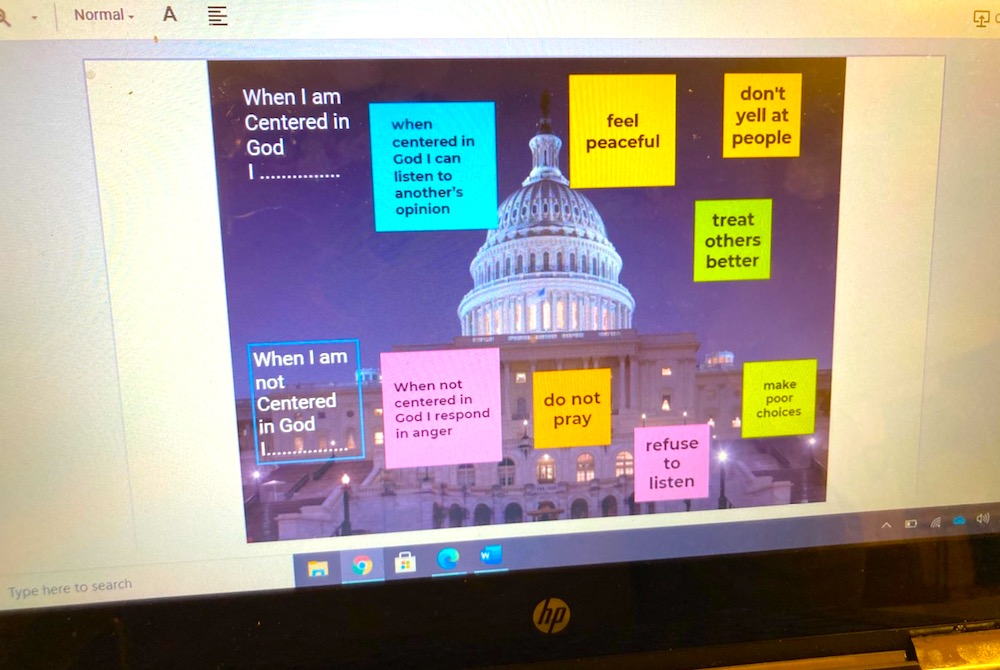National Guard riot shields are seen outside the U.S. Capitol in Washington Jan. 13, 2021. (CNS/Reuters/Jim Bourg)
I woke up on the day after the violence at the U.S. Capitol and my first thought was, I need to figure out what happened. I was not able to watch much of what going on there until later in the day on Wednesday. The sister I lived with had CNN on, and I caught a glimpse of it and said, "Wait! what, they got inside the Capitol?" Disgusted and exhausted, I went to bed.
In the morning, I tried to piece together what happened. I stopped looking at the horrific photos of people scaling the Capitol façade and said to God, "Look, just in case you were not aware, it is 2021.The hard parts of last year are over, the not knowing what is going to happen at any given moment is over, racist behavior and hate should be on the decline. It seems like you need a reminder, to end all of this already!"
God responded by giving me my own reminders throughout the day. Those moments were reminders that the ways I want God to act and the ways I want the world to work are not up to me. Sometimes I have specific ways that I think God should work in my life. I have not been too successful with telling God exactly what I want to happen and having it happen. All I can say about this is some lessons are learned very, very slowly.
When I reflect on my insistence to try to tell God how things should work, the words that come to mind are words from the song "Beautiful Things" by Gungor: "You make beautiful things / You make beautiful things out of the dust / You make beautiful things / You make beautiful things out of us. All around, / Hope is springing up from this old ground / Out of chaos life is being found, in you."
These words resonate with me, and yet on some days lately I want to literally take the words, crumple them up and throw them away. That seems dramatic but I — along with many others — are tired of the pandemic, and tired of the chaos that hatred breeds.
Advertisement
On the day after the chaos at the Capitol, I was not in the mood to try to find hope. I wanted God to hear my request to fix everything. I wanted God to be a magician — but alas, that is not who God is. I was standing in my classroom trying to get it together, to welcome the teens about to walk in the door.
The words of Catherine McAuley, the foundress of the Sisters of Mercy, floated around in my mind: We are centered in God, for whom alone we go forward or stay back.
I said, "Okay, God, how about I stop with the demands, and together we welcome these teenagers?" I was hoping I would soon find words that would give my students some ways to process what had happened.
My students walked in the room, and it started. All in one breath, a student said to me, "Hi, Sister, why were those protesters at the Capitol not treated the way the Black Lives Matter protesters were?"
I took a deep breath and asked my students to pause and begin class the same way we do every day — with prayer. As their prayers filled the room, I looked around the room and could see the calm begin to take hold. I ditched the lesson for the day and — winging it — I asked them to please put two answers on the electronic whiteboard, so that both those students at home and those students at school could see it.
The prompts were: When I am centered in God I… When I am not centered in God I…
We talked about their answers, which included, "When I am centered in God, I can listen to another's opinion," and, "When I am not centered, I forget all about God and respond with anger."
We processed what happened at the Capitol. I kept emphasizing that we will move forward with the help of God.
Another question went up on the board: How will remembering God is a part of all of this help you?
One answer that appeared was, "It will help me remember to respond to others with peace." Another said, "When I think of God, I think of love, so I will try to be more loving when having conversations where I know I have the right answer."

The lesson's whiteboard where students responded to prompts about being centered in God (Jennifer Wilson)
My students do not have the same kind of relationship with God that I do, and I do not expect them to. But on that day, I was able to bring my relationship with God into the classroom and use it to help them move forward.
When they walked out of room at the end of the hour, I smiled. I said a prayer of thanks to God for being present with us during the discussion, for helping us to process and grieve — but also to move towards healing. To get "unstuck," to center ourselves in God and move forward.
[Jennifer Wilson is a member of the Sisters of Mercy of the Americas. She has worked with homeless women and children as a social worker and presently is a theology teacher and the diversity, inclusion and equity coordinator at Mount Mercy Academy in Buffalo, New York.]







